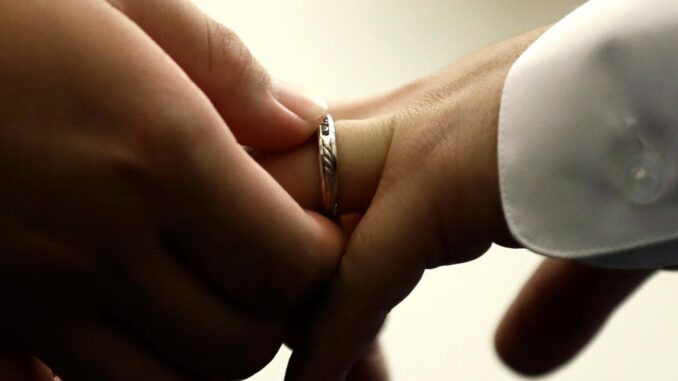
NEW YORK — Uncle Jim is profoundly red, politically speaking. Cousin Jane is liberal, activist left. The two can’t usually be in a room together without sparks flying, but both are invited to your wedding.
“I’ve had couples call me in a panic after realizing their seating chart might accidentally turn their reception into a town hall debate. Fun times,” Los Angeles wedding planner Natalie Benett said.
“As much as we all wish weddings could be a bubble of pure joy and confetti, sometimes the world outside sneaks in, and election cycles are no exception,” she added.
As the polarizing November election creeps closer in the U.S., wedding planners, etiquette experts and conflict-resolution pros have an arsenal of strategies for mitigating political friction at weddings, especially those well-soaked in alcohol from an open bar.
First and foremost: Get ahead of it with friendly pleadings on wedding invitations, websites and even signage posted at the welcome table on the big day imploring guests to leave politics at the door.
Distance potential sparring partners when planning seating arrangements. Well-placed human buffers can help if putting a football field of real estate between guests who are likely culprits isn’t feasible, Benett said.
“Another trick I’ve seen work is having a designated peacekeeper. Maybe it’s your maid of honor, or that one family friend who’s great at steering conversations back to, ‘Oh my gosh, did you see her dress?’ It’s all about knowing who can step in and diffuse the tension with charm,” Benett said.
Etiquette consultant Jo Hayes calls those useful folk “diffusers,” the socially skilled, suave, well-spoken brother/sister/cousin/friend who can intervene if political divisions get out of hand.
“They can swoop in and, hopefully discretely, diffuse the situation, pull one of the parties away and engage in conversation, then advise the warring parties to avoid political discussions for the rest of the evening,” she said.
Relying on the hired help can go a long way. Planners, DJs, videographers and photographers interact with guests throughout the festivities.
“We’re perfectly positioned to redirect conversations. We’re the first line of defense when political tension arises,” said Mary Angelini, founder of Key Moment Films, a wedding videography company in Palm Beach, Florida. “Keep the photo and video team in the loop on any concerns.”
Former political consultant Brian Franklin is co-founder of Vows & Speeches, a Los Angeles-based company that helps customize just that: Wedding vows, and speeches for nuptials and other events.
“When it comes to the reception speeches and toasts, it’s critically important that couples instruct those speaking not to mention or joke about politics, politicians or controversial subjects,” he said.
That may seem obvious, “but it’s surprisingly common for us to have to help our clients understand that the purpose of these moments is to pay tribute to the couple, not to do a comedy routine or scare up votes.”
Wedding professionals know firsthand that elections can bring out passions. Don’t underestimate the use of a quip to shut down the banter, said Kristy Diana, a planner for Chicago-based Lola Event Productions.
Try, she said: “‘This sounds like a better conversation topic for tomorrow when it’s NOT my wedding day! Thank you, and aren’t the musicians great?’”
If there’s a specific worrisome person, assign a babysitter.
“If you have an aunt who tends to rant, maybe task your cousin to keep an eye on it. If need be, a firm hand on the shoulder and a few words reminding them that they don’t want to be remembered for being a distraction at the wedding can go a long way from a loved one,” she said.
Brittny Drye, founder and editor in chief of the wedding resource magazine Love Inc., suggests keeping guests busy.
“The more entertained your guests are, the less likely they are to delve into deep political discussions,” she said.
Lawn games, photo booths and live entertainment are great ways to keep problem conversations at a minimum, Drye said.
“Loud music always helps,” she added.
Not all political discussion is bad, so long as it doesn’t get out of hand. Johanna A. Solomon, an assistant professor at the Kent State University School of Peace and Conflict Studies, sees weddings as an opportunity to reimagine conflict as something productive and useful.
“Having new family members with different viewpoints is a fantastic chance to learn to see those of different perspectives as fully human. Connecting with and loving people with different backgrounds can humanize individuals’ stories and experiences,” she said.
If that doesn’t work, look for connections elsewhere. Try tables with themes or discussion questions. That would help guests find common ground around neutral interests like who enjoys spicy food, football or gardening, Solomon offered.
Weddings can be wonderful opportunities to bring families and friends together, and that remains true even in a contentious election year, said Laura Brezel, a wedding planner and owner of O Frabjous Day Events in Oakland, California.
“While marriers are now more frequently curating their guest lists to groups of people who are supportive and positive, sometimes couples have to invite family members or friends who don’t play well with others,” she said.
Brezel recommends taking on wedding talk with potentially difficult guests before the day, or ask a family member to do it as your proxy.
“If you can’t talk to your uncle with famously rabid political views, can you ask a parent or sibling to do so for you? This may also apply to your most outspoken friend from college,” she said.
But also make your wishes known to all your guests, whether that means a mention from the officiant or a note on dinner menus, Brezel said.
“When the message is given to everyone, not just potentially vocal guests, it helps remind all the guests about the purpose of the wedding,” she said, “and then everyone can more easily get on board with helping to keep the peace for your beautiful day.”


Be the first to comment